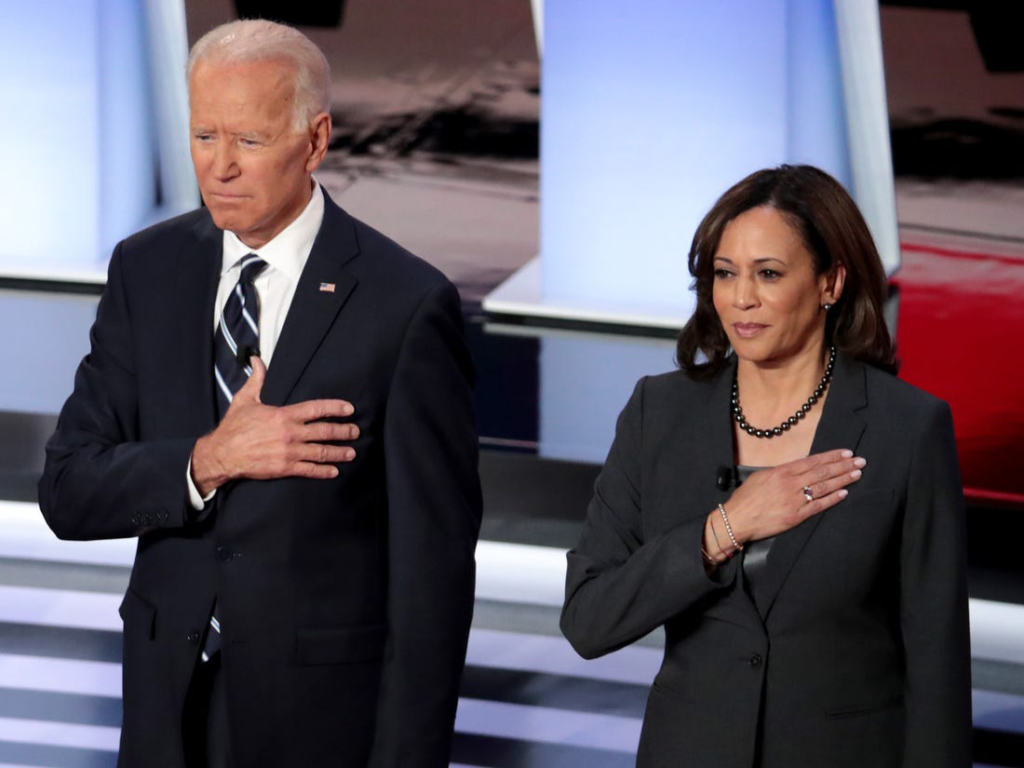2020 Democratic National Convention: For Biden and Against Trump

Image courtesy of Deadline
By Eva Lynch
The 2020 Democratic National Convention (DNC) aired August 17 through August 20, and the weight of one of the first events for the Biden-Harris ticket was felt by all.
The first virtual DNC featured major speakers each night, opening with former first lady Michelle Obama, and later Dr. Jill Biden, former President Barack Obama, and vice presidential nominee Kamala Harris, closing with an impassioned acceptance speech from presidential nominee Joe Biden.
At the beginning of the election cycle, when the volume of candidates proved historical, many Americans anticipated a multi-candidate convention. Instead, speeches presented a front strongly united around the last remaining candidate, Joe Biden, and against the incumbent, President Donald Trump. The four-night event resulted in an overwhelming consensus about must-watch speeches, including speeches by Michelle Obama, Barack Obama, and those from the nominees themselves. Overall, the docket featured politicians from all over the political spectrum, from progressives like Rep. Alexandria Ocasio-Cortez and Senator Bernie Sanders to prominent Republican figures like former governor John Kasich and former Secretary of State Colin Powell.
Many commentators said this range was to be expected as part of the theme for the convention, “We the People.” In this vein, Biden and most of the other speakers depicted himself as a leader for everyone, not only for those who vote for him, attempting to clinch the moderate and independent voters he is depending on, but also insinuating that this favoritism is characteristic of the incumbent. This overarching theme was further fleshed out in sub-themes which colored each night’s distinct message.
The first night, Michelle Obama led a plea to Americans “to vote for Joe Biden like our lives depend on it,” toward the Democrats’ ultimate goal to defeat President Trump. This tactic was meant to appeal to the 58% of voters who say their vote for Biden is more against Trump than for Biden, according to an NBC News/Wall Street Journal poll. While Senator Sanders blatantly called Trump an authoritarian, it was Michelle Obama who delivered arguably the most sincere indictment of Trump’s leadership of the night.
“Being president reveals who you are,” Obama said, later calling the president out for lacking the empathy necessitated by the job.
Her speech hailed inspiration from her most famous “when they go low, we go high,” speech as she reassured Americans that going high is “the only thing that works” when others go so low, even though going high is never easy.
Former Governor of Ohio John Kasich branded himself a “deeply worried” Republican, whose attachment to his party comes second to his patriotism. Kasich echoed Obama and Sanders in urging Americans to cast their votes, because “the future is priority.”
On the second night of the convention, Biden became the official nominee for the Democrats. Following the all-virtual delegate roll call, featured speakers included John Kerry, the last Democratic nominee to challenge an incumbent, Colin Powell, one of the leading Republicans backing Biden, and Dr. Jill Biden.
Both Kerry and Powell gave short speeches compelling voters toward Biden and, once again, away from Trump. But what the convention needed after the constant indictment of the incumbent was a personalization of Joe Biden; as analyst Peter Hart put it, Biden is “well known but not known well.”
Dr. Jill Biden sought to deliver.
The former second lady offered a personal account of the real Joe Biden, superseding other speakers’ superficial announcements of the duration of their friendship with Joe to assert their credibility on his character. Jill’s heartfelt speech, given from a classroom in the high school at which she formerly taught, included vulnerability about losing their son Beau, not to his time deployed in Iraq, but to a brutal battle with brain cancer that inspired the Biden Cancer Initiative.
“If we entrust this nation to Joe, I know he will do for your family what he did for ours: bring us together and make us whole, carry us forward in our time of need, keep the promise of America for all of us,” Jill encouraged, painting a picture of a concerned father eager to lead his family of 330 million out of crisis.
Following her salutation, the cameras kept rolling long enough to show a sweet and supportive moment between the couple, during which Biden introduced himself as “Dr. Jill Biden’s husband,” further emphasizing Biden’s warm, family appeal.
The third night of the convention featured former President Barack Obama, and the theme of the night accordingly shifted to convincing voters that Biden’s hand was present in every Obama-era decision, including the Affordable Care Act and management of H1N1 and ebola outbreaks, and as such would be capable of handling the issues currently plaguing the country and the world.
In a speech that transported voters back to the rhetoric of his presidency that set the standards by which all succeeding presidential oratory would be judged, Obama further maintained Jill Biden’s mission of personally accounting the real Joe, calling him a friend and brother. Obama then passed the torch as the first Black presidential nominee to Kamala Harris, who was officially named the first Black vice presidential nominee and gave a moving yet mimetic acceptance speech to close the third night.
Harris is widely known for her favorite nickname “Momala,” given to her by her stepchildren, and her speech promised to be Momala to every American and to live out her first words in a courtroom: “Kamala Harris, for the people.”
She ended her speech in an echo of others’ same promises and pleas; that not only are Joe and Kamala the ones to pull America out of the current time, but that Donald Trump is definitely not; that Americans must now more than ever take advantage of their unique freedom to vote.
Finally, the token keynote speaker on the closing night was the nominee himself, Joe Biden. Few others had touched on tangible policy points for voters to grab onto, but, though Biden followed other speakers in failing to mention the protests and looting happening across the country, he did not disappoint when he only briefly touched on his disapproval of Trump and focused the rest of his acceptance speech on delineating his presidential platform.
He promised to roll out his already-developed COVID-19 plan on day one in office, assuring Americans that the current economic state and social issues cannot be adequately addressed until we recover from the virus. Biden described a vision for an administration that could not be more different than the one we have seen cultivated over the past four years: he vowed not to “cozy up with dictators,” to never bar the public’s right to vote but to instead fight voter suppression, and to lead the generation that will eradicate racism and hate.
“It has been in our darkest moments that we’ve made the greatest progress, that we’ve found the light,” Biden said, in a speech reminiscent of FDR’s famously comforting fireside chats.
Overall, the DNC delivered a refreshingly and intentionally streamlined message to voters, almost begging: not only do Americans absolutely have to vote, but vote for Biden and against Trump. For more information on how to vote during a global pandemic, visit vote.org.






